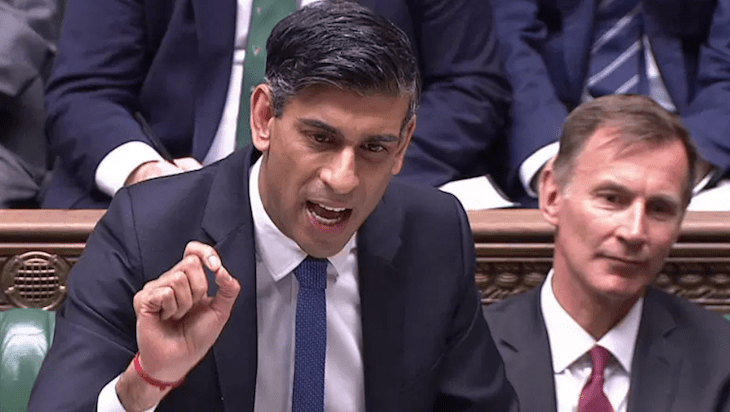Rishi Sunak had a much better Prime Minister’s Questions than he might have expected, given the worrying economic news this morning. The Prime Minister sometimes turns up with too much, over-caffeinated energy. Sometimes he tries to defend his government with attacks on Labour that don’t sound as though he came up with them himself. But today he was confident and repetitive as he argued that the strategy he and Chancellor Jeremy Hunt were pursuing was the right one.
Keir Starmer led on inflation, quoting Conservative MP Lucy Allan’s warning that the country was facing a ‘mortgage catastrophe’. He asked if Sunak agreed with Allan. The PM replied:
‘It is also right that we do support those with mortgages and this is why the absolute right economic priority is to halve inflation. Because inflation is what is driving interest rates up, inflation is what erodes people’s savings and pushes up prices and ultimately makes them poorer. This is why, a long time before I had this job, I highlighted the importance of tackling inflation, it is why I said it is never easy to root out inflation but we will take the difficult and responsible decisions to do so. It is an approach that the IMF has strongly endorsed…’
Starmer then briefly mocked Sunak’s detachment from the Boris Johnson Privileges Committee row, before returning to the mortgages question, asking ‘how much the Tory mortgage penalty is going to cost the average homeowner’.
The ‘Tory mortgage penalty’, by the way, may be Labour’s own phrase but it isn’t as good as the other two names of ‘Mortgage catastrophe’ or the even better ‘mortgage timebomb’. A penalty sounds like something annoying you’d receive in a letter from HMRC or the council for parking on a double yellow line or being slow with your tax return, not something so threatening that it causes you to default on your mortgage.
Sunak seemed keen to go back to the regime he was first elected under
Anyway, Sunak then made a confident argument over the next two answers about the ‘global macroeconomic situation’ and listed what the government was doing. This isn’t enough even for Tory MPs, who only yesterday were pleading with the Chancellor to do more.
Starmer continued to make references to Sunak’s wealth, saying:
‘I’m sure from the vantage point of his helicopter, everything might look fine, but that’s not the lived experience of those on the ground. After 13 years of economic failure, across the country, people are paying the price of uncosted, reckless, damaging decisions by the Tory party.’
He then drew a contrast between the Conservatives ‘rewarding those guilty of economic vandalism’ and ordinary people worrying about their mortgages.
The Labour leader also had a case study of James in Selby, who, while presumably eagerly anticipating the by-election, is also in a financial fix as a result of rising mortgage costs and is having to downsize significantly. Sunak retorted that the Labour leader needed to explain to James ‘that his economic policies would make James’s situation worse’, and quoted the Institute for Fiscal Studies on Labour. It was very similar to the performance George Osborne gave at the covid inquiry yesterday: with every suggestion that his austerity policies might have made the UK’s response to the pandemic weaker, the former chancellor had a quote from an international body here, a statistic there to drive home the point he made relentlessly when in government about the Tory ‘long-term economic plan’.
That kind of repetition has been absent in Tory politics for years, with the only thing that tends to repeat itself being internal party drama. Sunak seemed keen to go back to the regime he was first elected under.







Comments